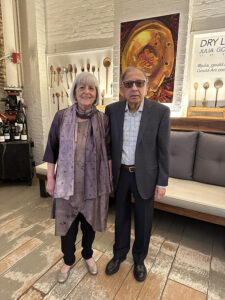This post originally appeared on Murder Is Everywhere.
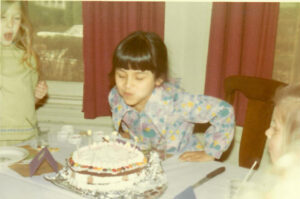
“I don’t want to talk about age.”
A smart, accomplished, and elegant woman friend said this to me recently. I still do not know her age and am not going to ask her again. I suspect that this lovely person believes she’d be treated differently if people knew; perhaps even rejected.
My mother also doesn’t do much chatting about her age. She’s a vibrant woman, beautiful inside and out, who raised three daughters, traveled the world enthusiastically and is now retired from business life. Speaking candidly, she says that she sometimes has a feeling of irrelevancy because she’s passed 80. In public, strangers seem to overlook her and don’t take what she says seriously.
Ageism is a word that is believed to have been coined in 1969 by the psychiatrist Robert N. Butler, when speaking to a Washington Post reporter about some people’s reaction to the housing for the elderly poor being built in their neighborhood. And while this original example is quite macro in nature, there are so many micro-aggressions and other insults. I’m learning that people being treated as “old” rather than the people they feel like inside is painful.
My first experience was ageism was brought about by myself, to myself. I was 43 years old and standing in the checkout line at Giant Foods with my toddler daughter and a babysitter. The friendly cashier asked if the 23-year-old babysitter was my daughter. I was horrified as being mistaken as someone who could have such an old child—that it meant I was likely fifty or some similarly grotesque age. And now, the irony is that I have a child who’s almost 23.
And I am actually SIXTY years old.
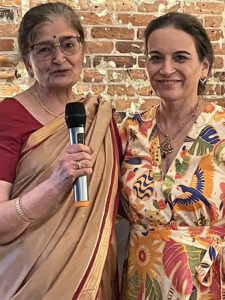
When I was much younger, I imagined certain stages so clearly. These included transforming into a college freshman; turning into a news reporter; becoming a bride; and being able to write “mother” on a pediatrician’s form. I never let my imagination roam as far as becoming a grandma; and now, when I look at my young adult son, I ponder whether he will have a role in that someday.
Then I sternly reprimand myself. Asking my son to make me into something else isn’t a strong way to live—it harkens to the other identity milestones. It was a college admissions officer who granted me entry as a student; an editor who hired me as a reporter; a boyfriend who asked if I’d marry him; and a judge who signed the papers allowing me to be an adoptive mother.
My recent step up to becoming 60, though, is a solo accomplishment. And I’m surprised to report how good it feels to be here. I’ve heard the fifties is a very happy decade for many women in terms of professional life and personal freedom. Fitting the stereotype, this was the era that I started a new mystery series that was my most successful. I became very busy with books and the adjacent promotional responsibilities. But my longed-for decade of professional recognition was also the time in which my immune system battled two diseases and my family suffered many emotional hardships, including the loss of our daughter. I am glad to gently close the door on my fifties and embrace the Big 6-0.
And how strong I feel! I watch myself jumping on my small rebounder trampoline several times a week, light strength training, swimming and doing water-aerobics, and fast walking over hilly terrain with older women friends who are faster than me. I feel confident I’ll get even stronger this year. Someday in the far future I might shuffle and have trouble walking. But not for a long time—and its quite possible that my experience of waning strength, body and mind, won’t be catastrophic.
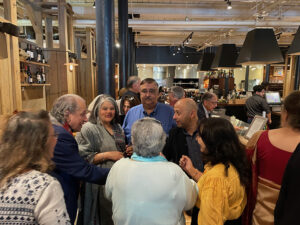
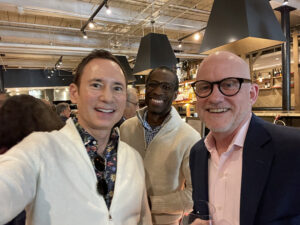
I asked Tony what he thought about me planning a significant 60th birthday party. He hadn’t wanted one for himself, but he liked the idea of my doing it, especially at a cozy Basque restaurant, La Cuchara, a few miles from our house. The invitations went out: not to every friend I have, but to the ones I’ve spent significant time talking about highs and lows with during recent years, as well as longtime friends from college and past jobs, and those in my family who were able to come.
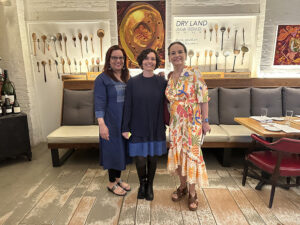
In the four months before my party, I read a book called The Art of Gathering: How We Meet and Why It Matters by Priya Parker. It’s not a regular party planning book; it’s about bringing meaningful connection to people through a host’s work. I was intrigued enough to also take Priya’s video course that aids in personalizing your own gatherings with plenty of cases to study and worksheets to dig deep into one’s true motivations for bringing people together. I took it all to heart. The invitations I sent hinted that each guest should not bring gifts, but expect to share deep conversation.
I greeted everyone at the door and handed them a paper with a random icebreaker question to ask someone they didn’t know. At the designated dinner tables, people were grouped and asked to answer a question or two of their choice. The first question asked them to talk about about a twist in their life and what personal strength they used to pull through. The second option was to share a piece of advice they wish they’d had at a younger age. As I went around the tables to make sure people were OK, a friend joked that I was being “very prescriptive,” but by party’s end she was raving about the joyous communication the table conversation had brought her. And this was my secret intention all along: I wanted people to find strength and happiness in themselves.
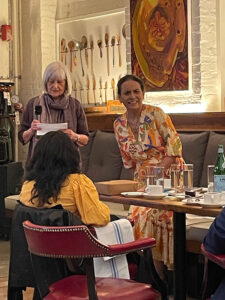
I sat with my husband, my mom and stepdad, and three other friends. The party buzzed with conversation at the six tables where friends and family sat. During dessert, many friends spoke aloud to the whole group on their thoughts about aging as well as our shared relationships. I stood next to them and felt truly humbled by the sincere and loving tributes.
In the days since the party, I’ve mulled over that feeling of being overcome during the tributes. I recognized not being able to accept praise is the very demon that makes people feel miserable about aging. If we positively credit to others, why can’t we give ourselves credit, too? I always thought it was corny when people spoke of “loving themselves,” but now I understand it’s not only a desirable trait, but one necessary for mental survival.
My friend Betsy said that aging means living deeply. In my mind, this idea means accepting sadness and loss: feeling it, rather than pushing it away. I do that better at sixty than at twenty. I’m also trying to remember to look at all the people around me with fresh eyes, noting their vulnerability and gifts. This generally results in good feelings and can transform an encounter.
I am a woman entering the third act of life. In books and movies, that final third is where the pace really picks up and a climax approaches. Of course, there will be a dénouement; but reading the ending before its time is never a good idea.
